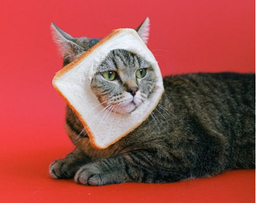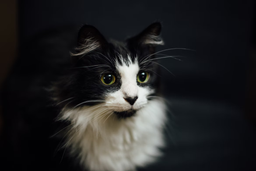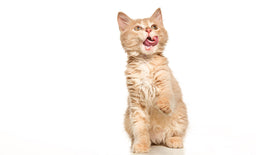My elderly cat is vomiting undigested food. What’s going on?
Why would a senior cat get sick after eating and throw up undigested food? Before we dive deeper into the reasons why, it’s important to differentiate vomiting from regurgitation. The main difference between the two is the state of the ejected contents.
When a cat vomits, the contents are digested, while regurgitation results in the ejection of cylindrical masses of undigested food.
This guide by Untamed will ease your mind by:
- Analysing why would an elderly cat be vomiting undigested food
- Presenting solutions for the issue
- Revealing how high-quality human-grade cat food can prevent your cat from regurgitating again
My senior cat is vomiting undigested food (regurgitating) hours after eating. What should I do?
Cats could regurgitate because of:
- Gorging—Cats gorge when they are obsessed with a particular food product or when there’s a large time gap between meals, and they become hungry
- Motility, obstructive, and other disorders
Check the table below for more details:
|
Obstructive disorders |
Motility disorders |
Other |
|
|
|
What else to look out for when your cat is regurgitating
Regurgitation typically won’t be the only sign that your feline isn’t feeling well. If your kitty is nauseous, look out for the following symptoms:
- Sneezing—The combination of regurgitation and sneezing typically indicates feline coronavirus or an upper respiratory tract infection (also known as rhinitis, rhinotracheitis, and herpesvirus 1)
- Defecating—Projection of contents from both ends of the digestive tract is a sign of diarrhoea, constipation, or intestinal inflammation
- Overdrinking—Increased thirst alongside regurgitation could mean your kitty is struggling with cancer, diabetes, or kidney disease. If you notice your feline overdrinking, you will have to monitor their water intake and remove their water bowl. The excess water could cause them to regurgitate again
- Constipation—Felines can regurgitate when they can’t do a number two because the strain and abdominal pain make them sick. If you suspect your kitty could be constipated, monitor their litter box
You should take your furry friend to the vet immediately if they show any of the symptoms listed above. The following signs are also red flags:
- Pale gums
- Low body temperature
- Appetite and weight loss
- Abdominal pain upon touch
- Frequent vomiting (several times in a row)
- Food or water rejection for 12 hours or more
Regurgitation should be taken seriously if your cat is struggling with acute or chronic illness (for example, diabetes or hyperthyroidism).
If your kitty ejects a worm, not only do they need immediate medical attention, but you will also have to deworm all animals in your home. This is necessary so that your feline doesn’t get reinfected or infect other pets.
How can vets help cats who have been regurgitating?
Monitoring your kitty’s behaviour will help the vet administer appropriate treatment. The vet will inquire about:
- Characteristics of the ejected content (odour, colour, texture)
- Frequency of nauseous episodes
- Accompanying symptoms your feline has shown
- Recent changes in their diet
- Access to dangerous substances your feline might have had, such as:
- Toxic foods and common allergens
- Toxic chemicals
- Medication
Providing as much information as possible will prevent your kitty from going through unnecessary testing and speed up the diagnostic process.
The vet will recommend adequate treatment depending on what caused your cat to regurgitate. If your cat turns out to be allergic to a particular ingredient in their food, the vet will prescribe a hypoallergenic diet.
Diagnostic procedures for regurgitating cats
Exact diagnostic procedures depend on the symptoms your furry friend has shown alongside regurgitating. Check out the table below for more details:
|
Procedure |
Details |
|
X-ray |
Creation of an image of your cat’s bones and organs using radioactive waves |
|
Urinalysis |
Inspection of the physical and chemical properties of urine |
|
Ultrasound |
Non-invasive procedure used to examine internal organs (their size, shape, and texture) |
|
Blood analysis |
Evaluation of your cat’s:
|
|
Cytology |
Collection and inspection of cells, fluids, or tissue |
|
Endoscopy |
Sample collection from the digestive tract using a flexible rod with a camera |
|
Laparotomy |
Exploratory surgery performed upon the suspected presence of a foreign body |
Taking care of a regurgitating senior cat—what can you do until you determine whether your kitty needs professional help?
Not all cases of regurgitation require medical attention, but you have to monitor your furry friend to determine that. It’s also important to know how to take care of a regurgitating feline in case your vet isn’t available immediately. You can help your nauseous kitty feel better if you:
- Remove food (but allow limited water intake) for two hours
- Offer a teaspoon of steamed or boiled chicken or fish to your cat after two hours have passed
- Feed the same amount of food to your kitty every couple of hours if they don’t vomit after eating
How to entice your feline’s appetite when they are feeling unwell
Food rejection is normal in sick cats, but they must ingest the essential nutrients so their condition doesn’t worsen. You can do this by:
- Cooking some soup or broth and adding it to your cat’s favourite food
- Warming their food to room temperature or slightly more

Mum got me Untamed—my favourite!
Image (c) Untamed
How to prevent your cat from regurgitating
Regurgitation is preventable—you can help your kitty by:
- Distributing their food into smaller, more frequent meals throughout the day
- Restricting their access to harmful food, plants, and chemicals
- Feeding them a high-quality diet
What should senior cats who regurgitate eat?
Food that has an optimal nutritional composition and is produced using quality ingredients will keep your furry friend’s body working like a swiss watch. What are those micronutrients, and how much should your cat have on a daily basis?
The three essential nutrients for cats are:
- Animal proteins
- Fats
- Vitamins and minerals
Animal proteins
Cats are carnivores, meaning their delicate digestive system is designed to process and absorb nutrients from meat, fish, crustaceans, and organs (liver being a favourite and exceptionally nutritious if fed in moderation). It’s safe to treat your feline to fruits, veggies, and grain occasionally, but a vegan diet isn’t for cats. Refrain from giving your kitty plant-based treats while they are feeling unwell.
Protein should make 50% or more of their daily food intake because it:
- Provides energy
- Supports healthy growth in kittens and maintains muscle tone in adult and senior cats
- Consists of intertwined amino acids that support vital metabolic processes
Cats can synthesise some amino acids, but taurine—the crucial micronutrient —is not one of them. Other than taurine, felines also can’t synthesise:
- Arginine
- Histidine
- Isoleucine
- Leucine
- Lysine
- Methionine
- Phenylalanine
- Threonine
- Tryptophan
- Valine
The only way cats can get these amino acids is from meat.
Fats
Cats use protein as their primary energy source, but if their supplies deplete, they use fat pretty efficiently. Fat is also a part of cell membranes and plays a significant role in nutrient transportation. The ideal daily intake of fat for cats is up to 20%.
Vitamins and minerals
Vitamins and minerals play an important part in your feline’s metabolic processes. The table below presents which ones are vital for your cat:
|
Vitamins |
Minerals |
|
|
What type of food is the best for cats suffering from regurgitation?
Deciding on a type of food can be particularly challenging when your senior cat is suffering from frequent regurgitation. Healthy cats can eat any type of food, dry, wet, or semi-moist, as long as it’s nutritionally complete. For regurgitating cats, quality wet food is the only option. All cats should have at least one wet meal per day for proper hydration.
If your senior cat has dental issues or missing teeth, serve them jelly and gravy products.
In case you have a picky cat who doesn’t want to give up their kibble, you can offer them:
- A mix of wet and dry cat food
- Biscuits with added water, broth, or soup
Another benefit of these options is that they are budget-friendly.
Ingredients that meet feline nutritional needs
What should cats eat to stay healthy? Meat, fish, and crustaceans are the best options, but some are better than others. One way to recognise what’s the best food for cats is to take a look at its bioavailability index.
This value indicates how digestible a particular food is and how much of it can your furry friend absorb and utilise. Ingredients that have the best bioavailability index for cats are:
|
Animal category |
Animals |
|
Poultry |
|
|
Fish |
|
|
Crustaceans |
|
If you’re looking for premium-quality cat food made with the finest ingredients—try Untamed.

Mum, what are you doing with that plate after the shoot?
Image (c) Untamed
Get your furry friend back on their feet with Untamed
Nauseous felines need healthy and high-quality food to recover, and Untamed is a perfect choice! Our dishes are made from human-grade and sustainably-sourced meats, fish, and crustaceans, and our recipes are vet-formulated, which ensures your cat gets the essential nutrients.
Whether you have a kitten, adult, or senior, Untamed is perfect for cats of any age. The breed isn’t a deciding factor either—cats of all breeds, including Ragdolls, Persians, Bengals, Maine Coons, and British Shorthairs, found their favourite dish in our assortment. Fussy pregnant queens and neutered males enjoy and benefit from our meals as well.

I was angry at her, but she got me treats, so I can’t complain.
Image (c) Untamed
Here’s what cat parents say about Untamed
Pet parents who got an Untamed cat food subscription witnessed the power of healthy feline nutrition, and here’s what they reported:
|
Time |
Changes |
|
After one week |
Less mess in the litter box |
|
After two months |
High energy levels and fewer hairballs |
|
After four months |
Lean physique, sleek coat, and an overall healthy look |
|
After six months |
Easy weight management and no appetite fluctuations |
Do you want to let your kitty try Untamed but are unsure whether they’ll like it? Order our taster pack and let them be the judge!
Order your Untamed taster pack in a few clicks
Go to our online cat food ordering page to get your first box of Untamed delicacies and do this:
- Take our Try Now quiz
- Answer a few short questions about your cat
- Select a personalised meal plan and confirm your order
We’ll deliver the goods to you in one day. Our is always free! If your kitty grows fond of our meals, we can replenish your stock around the same time every month. We believe in convenience, which is why you can always modify, postpone, or cancel your order.

Can’t decide whether I like the food or the box more.
Image (c) Untamed
If your senior cat is vomiting daily and the contents are digested, here’s what’s going on
The contents your cat ejects could tell you what kind of problem your cat is dealing with. Check the following table for more details:
|
Consistency |
Colour |
Causes |
|
Foam |
White |
Inflammation of the stomach lining or small intestines |
|
Mushy or clumpy |
Green |
The problem lies in the small intestines |
|
Brown |
Food allergy, food intolerance, or a foreign object in the digestive tract |
|
|
Liquid |
Clear |
Excessive water drinking |
|
Yellow (bile) |
The stomach is empty because the feline is rejecting food or hasn’t eaten in a long time |
|
|
Brown (blood) |
Hairballs, ulcerations, or foreign objects |
|
|
Red (blood) |
Ulcerations, clotting abnormalities (a sign of poisoning), or irritation of the stomach and oesophagus (because frequent vomiting increases stomach acid production) |
Can nauseous cats have treats?
Whether the contents your cat ejected were digested or undigested, you should wait until your kitty gets back on their regular feeding schedule before offering treats. Don’t be surprised if your cat rejects their favourite wet or dry food at first—you can spark their interest in food by giving them tiny bits of:
Chicken liver is a great way to boost your cat’s vitamin levels, but keep the portions bite-sized as it can cause hypervitaminosis A (poisoning caused by abnormally high vitamin A levels).
You should skip fruit and veggie treats until your cat fully recovers, but once they do, you can give them bits of:

Treats are the way to my heart!
Source: sharonmancini
What is off the table for cats who have been regurgitating?
Food that is harmful to cats (especially nauseous ones) can be divided into two categories:
- Harmful food
- Toxic food
Harmful food
Your feline’s sensitive organism isn’t designed to handle human treats. The following food could cause indigestion and discomfort:
- Fat trimmings
- Grains (in large amounts)
- Milk and large amounts of dairy products such as cheese or yoghurt
Because of their high fat content and caloric value, all of these items cause stomach upsets, sometimes followed by vomiting and diarrhoea.
Toxic food
The following food is life-threatening for cats:
- Xylitol—This artificial sweetener elicits a sudden release of insulin, causing a condition called hypoglycemia (low blood sugar). Cats who survive typically experience liver failure
- Alcohol—Cats who ingest ethanol struggle with the nervous system malfunction, which shows as ataxia, loss of coordination, drops in blood pressure and sugar, and loss of consciousness. If untreated, alcohol poisoning leads to coma and death
- Mouldy walnuts—Tremorgenic mycotoxins, which produce some types of fungi, are often found on mouldy walnuts. These fungi are poisonous to cats
- Raw yeast—The fermentation process of yeast in the stomach produces large amounts of ethanol and carbon dioxide, causing malfunction of the nervous system and gastric dilatation volvulus—a life-threatening condition that happens when the stomach is so bloated that it twists
- Coconut flesh and meat—The oils present in coconut flesh cause stomach upsets, while the meat contains high potassium levels, which causes a life-threatening condition called hepatic lipidosis (also known as fatty liver)
- Raw meat and eggs—Raw food can contain bacteria (such as Clostridium botulinum) that cause severe poisoning and even death. Even tiny bits of raw chicken can cause harm. Raw egg whites can prevent cats from absorbing vitamin B7, causing a vitamin deficiency
- Grapes and raisins—The exact reason why grapes and raisins are toxic is unknown, but you should keep them out of your cat’s reach
- Chocolate and coffee—Caffeine and theobromine found in cacao products and coffee are extremely toxic to cats. Early signs of poisoning are vomiting and diarrhoea, while untreated toxicosis leads to coma, cardiac arrest, and even death
- Salt—Causes poisoning if more than half of a teaspoon is ingested
- Skin, stems, seeds, and leaves of pears, plums, apples, and cherries—These parts contain cyanogenic glycosides, which become toxic upon ingestion
- Allium vegetables (such as garlic, chives, onions, and scallions)—Two types of compounds found in these plants—disulfides and thiosulphates—cause severe damage to red blood cells, which can be life-threatening

![Best food for Ragdoll cats in the UK [Broken Down]](http://untamed.com/cdn/shop/articles/featured_best_food_for_ragdoll_cats_uk.jpg?v=1646818249&width=256)

